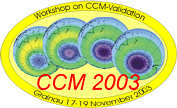 |
coupled chemistry-climate models |
 |
coupled chemistry-climate models |
| BACK |
Providing accurate and reliable predictions of future changes of
atmospheric ozone is of central importance in climate studies. It is important
to assess how reliable the current models are and what processes should
be included in them. Chemistry-climate interactions are of major significance,
because an increase of greenhouse gases and a slow decrease in halogen
loading is expected, both influencing the stratosphere and ozone. In recent
years a number of chemistry-climate models (CCMs) with different levels
of complexity have been developed. They produce, for example, a wide range
of results concerning the time and extent of ozone recovery. A scientific
discusstion has started to identify the main processes which determine
the behaviour of ozone in the atmosphere. The development of data products
from ENVISAT provides new information to test the understanding of atmospheric
processes and to improve the performance of CCMs.
The aim of the workshop is to identify the key underlying processes
that control the future evaluation of the ozone layer, and to find specific
diagnostics of these processes. The definition of specific diagnostic tools
will facilitate the evolution of complex models such as CCMs. To develop
a catalogue of requirements, the following scientific topics, which are
of significance with respect to ozone behaviour, will be discussed:
Posters:
It is expected that discusstion and poster presentations will be provided by all participants. The posters will be on display during the entire meeting. Plenty of time is allocated to poster sessions.Talks:
Each of the main sessions will begin with a 30-minute survey talk, followed by a few short talks chosen from the submitted abstracts. Each survey talk will be based around a central vugraph containing the processes relevant for the corresponding session plusWorking Groups:For Each Process
* A specific diagnostic (for that process) * Ranking (meaning how important is that process with respect to stratospheric ozone) * Uncertainties (well-known, etc.) * How can data be used for that diagnostic? (any requirements?) The aim is for the survey talks to describe what is needed to validate CCMs, and not to give a review of the state of knowledge in each field. The main part of the talk will be spent adding depth/justification to the criteria list. The short presentations on specific issues will help to develop this list and to provide the basis for the hour of discussion associated with each session as well as the working groups. There is plenty of time allocated for the poster session on the first day.
At the end of the workshop we'll have break-out sessions where people split into working groups (one for each of sessions). The outcome of the working groups of each session will be discussed in the final plenary.Chairs:
As a lead into the discussion the respective chairs will briefly summarize the key points from the presentations, raise open questions and highlight controversial issues. Rapporteurs will be assigned to each session.Assessment:
The outcome of the workshop will be a summary of that list published in the SPARC newsletter. Hopefully the workshop will stimulate a new
assessment of coupled chemistry-climate models.